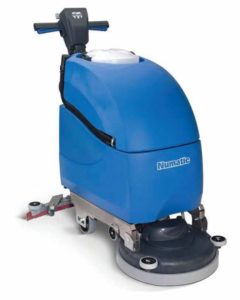Unequal inference
June 19, 2018 The “equal inference” rule has played an important role in Texas law about sufficiency of the evidence, especially after the memorable hypothetical in City of Keller v. Wilson, 168 S.W.3d 802, 814 (Tex. 2005): “Thus, for example, one might infer from cart tracks in spilled macaroni salad that it had been on the floor a long time, but one might also infer the opposite—that a sloppy shopper recently did both.” But that rule did not control in a slip-and-fall case involving the residue from an “autoscrubber” (right). The Fifth Circuit reasoned: “[Plaintiff’s] position is that the [security] video and Wal-Mart policies together suggest that (a) Wal-Mart used the machine to place slippery liquid on the floor, (b) the liquid was likely to collect in low-lying areas, (c) the machine paused over a low-lying area, (d) no Wal-Mart personnel checked for or took the requisite steps to remove it, and (e) [Plaintiff] slipped just where the machine had paused. This plausibly suggests the spill came from the auto-scrubber.” Garcia v. Wal-Mart, No. 17-20429 (June 18, 2018).
The “equal inference” rule has played an important role in Texas law about sufficiency of the evidence, especially after the memorable hypothetical in City of Keller v. Wilson, 168 S.W.3d 802, 814 (Tex. 2005): “Thus, for example, one might infer from cart tracks in spilled macaroni salad that it had been on the floor a long time, but one might also infer the opposite—that a sloppy shopper recently did both.” But that rule did not control in a slip-and-fall case involving the residue from an “autoscrubber” (right). The Fifth Circuit reasoned: “[Plaintiff’s] position is that the [security] video and Wal-Mart policies together suggest that (a) Wal-Mart used the machine to place slippery liquid on the floor, (b) the liquid was likely to collect in low-lying areas, (c) the machine paused over a low-lying area, (d) no Wal-Mart personnel checked for or took the requisite steps to remove it, and (e) [Plaintiff] slipped just where the machine had paused. This plausibly suggests the spill came from the auto-scrubber.” Garcia v. Wal-Mart, No. 17-20429 (June 18, 2018).